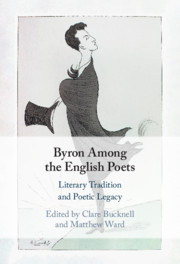Book contents
- Byron Among the English Poets
- Byron Among the English Poets
- Copyright page
- Dedication
- Contents
- Contributors
- Acknowledgements
- Abbreviations
- Introduction
- Part I Inheritances
- Chapter 1 Byron and Shakespeare
- Chapter 2 Not for Envy: Paradise Lost and the Inward Turn in Byron’s Cain
- Chapter 3 Byron and Rochester
- Chapter 4 Byron’s ‘Popifying’: Twice-Told Tales
- Chapter 5 ‘Liquid Lines’: Byron Among the Amatory Poets
- Chapter 6 Byron and Satire post-1760
- Chapter 7 Byron’s English Verse Inheritance
- Part II Contemporaries
- Part III Afterlives
- Index
Chapter 7 - Byron’s English Verse Inheritance
from Part I - Inheritances
Published online by Cambridge University Press: 22 July 2021
- Byron Among the English Poets
- Byron Among the English Poets
- Copyright page
- Dedication
- Contents
- Contributors
- Acknowledgements
- Abbreviations
- Introduction
- Part I Inheritances
- Chapter 1 Byron and Shakespeare
- Chapter 2 Not for Envy: Paradise Lost and the Inward Turn in Byron’s Cain
- Chapter 3 Byron and Rochester
- Chapter 4 Byron’s ‘Popifying’: Twice-Told Tales
- Chapter 5 ‘Liquid Lines’: Byron Among the Amatory Poets
- Chapter 6 Byron and Satire post-1760
- Chapter 7 Byron’s English Verse Inheritance
- Part II Contemporaries
- Part III Afterlives
- Index
Summary
Writing to Lord Holland in 1812, Byron anxiously petitioned the peer for help in completion of a couplet: ‘I wish I had known it months ago, for in that case I had not left one line standing on another.—I always scrawl in this way, and smoother as much as I can but never sufficiently, & latterly I can weave a nine line stanza faster than a couplet, for which measure I have not the cunning’ (BLJ, II. 210). Byron’s implausible boast about the velocity of his Spenserian scribbles is in part an attempt to re-establish his poetic credentials with a socially superior friend, yet it remains an odd pretension to assert. Not because of the improbability that he could write nine rhymed lines that incorporated a terminating couplet of sorts faster than a single pair, but because by the date of this letter he had already proven his skill in the couplet form in no fewer than three satires – English Bards and Scotch Reviewers (1809), Hints from Horace (wr. 1811) and The Curse of Minerva (also wr. 1811) – and would soon compose his second blockbuster Eastern narrative, The Corsair (1814) in the same form. For the purposes of this chapter, what’s most intriguing about Byron’s brag is not that he is dismissive of a form he returned to throughout his life, but that the forms that most preoccupied him during his early career were avowedly English.
- Type
- Chapter
- Information
- Byron Among the English PoetsLiterary Tradition and Poetic Legacy, pp. 114 - 128Publisher: Cambridge University PressPrint publication year: 2021

